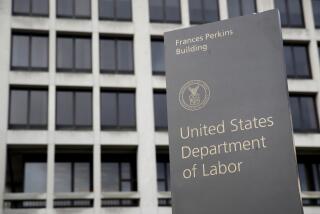U.S. Agencies Told to Increase Hiring of Temporary Workers
WASHINGTON — The Reagan Administration, seeking a less expensive and more “flexible work force,” is directing federal agencies to hire more temporary employees instead of career workers, beginning today.
Temporaries receive fewer benefits and are easier to dismiss.
Donald J. Devine, director of the Office of Personnel Management who ordered the change last week, said flexibility is necessary in times of budget cutting.
“I don’t know what happens in a budget situation,” he said. “We might have to be prepared to have fewer employees. That’s the idea of temporary employment.”
In his directive to the agencies last week, Devine wrote that “it is necessary to encourage use” of temporary employees because they are “very cost efficient.”
Devine said the government has hired up to 150,000 temporaries a year. But, he said, in the government’s employment reductions of the last four years “we’ve cut back mostly on temporaries rather than full-time employment.”
That, he said, created an imbalance which will be addressed by giving agencies more leeway to hire temporary employees. He called it “a simple management decision”--to do in government what private industry has done.
The New York Times today quoted Patrick Korten, a spokesman for Devine’s office, as saying the new policy represents a “big change, a significant turnaround in this area of personnel policy.”
Critics of the new policy said it could be abused for political patronage, since it allows agencies to keep high-level employees on a temporary basis for four years or more.
$41,105 Limit
The rules allow use of temporaries in positions up to GS-12 on the federal pay scale, jobs paying up to $41,105 a year.
“Temporary employees have significantly fewer rights and benefits than career employees,” according to one memorandum prepared for Devine and obtained by the New York Times. The memo said temporaries are not eligible for federal health benefits, can be dismissed “at will” and have no appeal rights or other protection afforded career employees.
The new rules double the length of time for which temporary employees may be hired, permitting renewal of annual appointments up to a maximum of four years.
In filling eligible job slots with temporary employees, the rules allow agencies to bypass lists of job applicants who have been screened by means of a written test or other evaluation of their education and experience.
Concern Expressed
Joseph Oglesby, a spokesman for the National Assn. of Retired Federal Employees, expressed concern about the new regulations.
“Temporary appointments can be used to subvert competitive hiring,” he said, “and may give the impression that a crony is being favored.”
The new system also was criticized by Kenneth T. Blaylock, president of the American Federation of Government Employees, representing 700,000 federal workers.
“The whole intent of the merit system, when it was established 100 years ago, was to build a long-term career work force that would maintain continuity when government changes at the top,” he said.
“With temporary employees, you get people who are just floating, who are between jobs or not looking for solid work. Are those the kinds of people we want inspecting meat, treating veterans and writing Social Security checks?”
More to Read
Sign up for Essential California
The most important California stories and recommendations in your inbox every morning.
You may occasionally receive promotional content from the Los Angeles Times.









